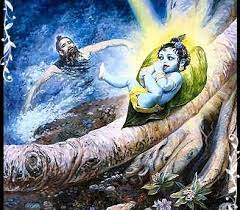“A mere show of renunciation is not sufficient to gain a person entrance into the kingdom of God. One must undergo a thorough change of heart, symptomized by a complete lack of interest in the self-destructive habits of sense gratification, both gross and subtle. Not only must the true sage refrain from even thinking of illicit sex, meat-eating, intoxication and gambling, but he must also give up his desires for reputation and position. All together these demands add up to a formidable challenge but the fruits of true renunciation in Kṛṣṇa consciousness are well worth a lifetime of endeavor.
The Muṇḍaka Upaniṣad (3.2.2) confirms the statements of this verse: kāmān yaḥ kāmayate manyamānaḥ sa karmabhir jāyate tatra tatra. “Even a thoughtful renunciant, if he maintains any worldly desires will be forced by his karmic reactions to take birth again and again in various circumstances.” Philosophers and yogīs work hard to become free from birth and death, but because they are unwilling to surrender their proud independence, their meditations are devoid of devotion to the Supreme Lord, and thus they fall short of the perfection of renunciation — pure love of God. This pure love is the only goal of a sincere Vaiṣṇava, and therefore he must vigilantly resist the natural temptations of profit, adoration and distinction, and also the impulse to merge into an all consuming impersonal oblivion. As Śrīla Rūpa Gosvāmī states in his Bhakti-rasāmṛta-sindhu (1.1.11):
anyābhilāṣitā-śūnyaṁ jñāna-karmādy-anāvṛtam
ānukūlyena kṛṣṇānu- śīlanaṁ bhaktir uttamā
“When first-class devotional service develops, one must be devoid of all material desires, knowledge obtained by monistic philosophy, and fruitive action. The devotee must constantly serve Kṛṣṇa favorably, as Kṛṣṇa desires.”
Source:A.C. Bhaktivedanta Swami Prabhupada (2014 edition), “Srimad Bhagavatam”, Tenth Canto, Chapter 87 – Text 39





















Leave A Comment